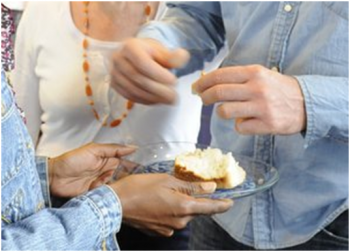(Romans 4:6-8 KJV) 6 Even as David also describeth the blessedness of the man, unto whom God imputeth righteousness without works, 7 [Saying], Blessed [are] they whose iniquities are forgiven, and whose sins are covered. 8 Blessed [is] the man to whom the Lord will not impute sin.
Paul is referring to Psalm 32, in which, David speaks of those blessed through faith and imputed righteousness:
(Psalm 32:1-2 KJV) 1 [[[A Psalm] of David, Maschil.]] Blessed [is he whose] transgression [is] forgiven, [whose] sin [is] covered. 2 Blessed [is] the man unto whom the LORD imputeth not iniquity, and in whose spirit [there is] no guile.
Imputation is God deeming us to be righteous, God accounts us as being righteous.
(Romans 4:20-25 KJV) 20 He staggered not at the promise of God through unbelief; but was strong in faith, giving glory to God; 21 And being fully persuaded that, what he had promised, he was able also to perform. 22 And therefore it was imputed to him for righteousness. 23 Now it was not written for his sake alone, that it was imputed to him; 24 But for us also, to whom it shall be imputed, if we believe on him that raised up Jesus our Lord from the dead; 25 Who was delivered for our offences, and was raised again for our justification.
Faith is believing God, being persuaded that what God says, he will, and is able to do.
We have the righteousness of God imputed to us as well when we place our faith in the Lord Jesus Christ and his redemption. We are to believe that Christ died for our sins and rose for our justification (declared righteous). Christ was made sin for us, we are given his righteousness.
(1 Corinthians 15:3-4 KJV) 3 For I delivered unto you first of all that which I also received, how that Christ died for our sins according to the scriptures; 4 And that he was buried, and that he rose again the third day according to the scriptures:
(2 Corinthians 5:21 KJV) For he hath made him [to be] sin for us, who knew no sin; that we might be made the righteousness of God in him.
(1 Corinthians 1:30 KJV) But of him are ye in Christ Jesus, who of God is made unto us wisdom, and righteousness, and sanctification, and redemption:
Paul is referring to Psalm 32, in which, David speaks of those blessed through faith and imputed righteousness:
(Psalm 32:1-2 KJV) 1 [[[A Psalm] of David, Maschil.]] Blessed [is he whose] transgression [is] forgiven, [whose] sin [is] covered. 2 Blessed [is] the man unto whom the LORD imputeth not iniquity, and in whose spirit [there is] no guile.
Imputation is God deeming us to be righteous, God accounts us as being righteous.
(Romans 4:20-25 KJV) 20 He staggered not at the promise of God through unbelief; but was strong in faith, giving glory to God; 21 And being fully persuaded that, what he had promised, he was able also to perform. 22 And therefore it was imputed to him for righteousness. 23 Now it was not written for his sake alone, that it was imputed to him; 24 But for us also, to whom it shall be imputed, if we believe on him that raised up Jesus our Lord from the dead; 25 Who was delivered for our offences, and was raised again for our justification.
Faith is believing God, being persuaded that what God says, he will, and is able to do.
We have the righteousness of God imputed to us as well when we place our faith in the Lord Jesus Christ and his redemption. We are to believe that Christ died for our sins and rose for our justification (declared righteous). Christ was made sin for us, we are given his righteousness.
(1 Corinthians 15:3-4 KJV) 3 For I delivered unto you first of all that which I also received, how that Christ died for our sins according to the scriptures; 4 And that he was buried, and that he rose again the third day according to the scriptures:
(2 Corinthians 5:21 KJV) For he hath made him [to be] sin for us, who knew no sin; that we might be made the righteousness of God in him.
(1 Corinthians 1:30 KJV) But of him are ye in Christ Jesus, who of God is made unto us wisdom, and righteousness, and sanctification, and redemption:



